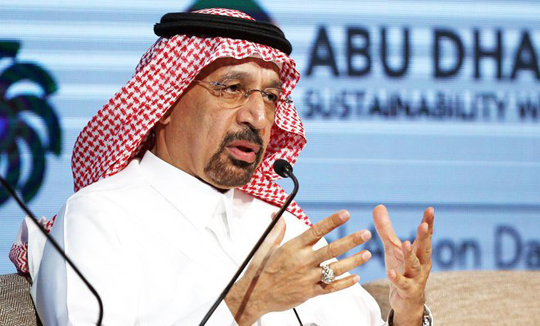Jeddah, Jan 17: Saudi Arabia is launching a renewable energy program in the next few weeks that is expected to invest $30-$50 billion by 2032, Energy, Industry and Mineral Recourses Minister Khalid Al-Falih announced Monday.

Al-Falih said at the World Future Energy Summit in Abu Dhabi that the Kingdom would start the first round of bidding for projects under the program, which would produce 10GW of power.
He also said that Saudi Arabia is in the early stages of studying its first two commercial nuclear reactors with a total of 2.8GW. Al-Falih told Reuters that, “there will be significant investment in nuclear energy.”
The minister also said Saudi Arabia was working on ways to connect its renewable energy projects with Yemen, Jordan and Egypt.
“We will connect to Africa to exchange non-fossil sources of energy,” he said.
The step falls into the country’s targets set in Vision 2030, launched last year to prepare for a post-oil era following a plunge in oil prices. Saudi Arabia, the world’s largest oil exporter, plans to reduce its reliance on oil and diversify the economy by moving toward sustainable sources rather than depending on fossil oil.
Renewable energy is listed among the sectors to be launched, as the Vision reads: “In the manufacturing sector, we will work toward localizing renewable energy and industrial equipment sectors.”
John Sfakianakis, director of economic research at the Riyadh-based Gulf Research Center, told Arab News that Saudi Arabia has a “considerable solar power potential” that can reduce its reliance on fossil fuels.
“Saudi Arabia wants to balance economic needs against environmental goals as it has considerable solar power potential and is eager to reduce its use of fossil fuels,” Sfakianakis said. “The country ranks high in per capita greenhouse gas CO2 emissions.”
Achieving the ambitious renewable energy program by 2032 needs time, technical knowledge and capacity, and above all coordination between various stakeholders, according to energy expert Mohamed Ramady.
“The fact that there are many stakeholders in Saudi Arabia involved in the renewable energy program, such as KACST, KACARE, KAPSARC and KAUST among others ensures some duplication of effort and above all lack of specific focus for renewables,” said Ramady, a former professor at King Fahd University of Petroleum and Minerals.
He told Arab News that whether the focus would be on solar or nuclear energy would determine the policy and would lead to different paths and options in terms of domestic and international cooperation.
“If nuclear energy option is the preferred option, then Saudi Arabia has to assess whether current leaders using such energy like France, South Korea and Finland are still committed to this renewable energy source in the long term and whether their technology transfer and nuclear waste programs can be safely transferred,” Ramady said.
Achieving a viable large-scale renewable energy application is not as easy as it sounds, according to Ramady.
“The United Arab Emirates’ (UAE) MASDAR renewable energy model city initiative was a path breaker with mixed success, but from which valuable lessons can be learned by Saudi Arabia,” he said. “However, in the meantime starting off by installing smart electricity household meters coupled with incentives to save energy could help to reduce pressure on the government in the face of potential lower oil prices and revenues.”
The Riyadh-based King Abdullah Center for Atomic and Renewable Energy (KACARE) stated that hydrocarbons would remain a prime element in the energy mix in 2032, by an estimation of 60GW. This will also be supported with nuclear energy at 17.6GW, solar at 41GW, of which 16GW will be generated through the use of photovoltaic cells and the balance of 25GW by concentrated solar power, wind at 9GW, waste-to-energy at 3GW and geothermal at 1GW.
Renewable energy is increasingly becoming a new sector in the country and is expected to expand until the new renewable energy program can reach its target by 2032.
“By creating an entirely new sector for the economy, jobs will be generated as it moves into more advanced areas of the production chain. Job creation for Saudis and a cleaner environment are important goals of Vision 2030 for better quality of life values,” said Sfakianakis.
According to the International Renewable Energy Agency (IRENA) report on renewable energy market analysis in the Gulf Council Countries (GCC) region, Saudi Arabia is the world’s seventh largest oil consumer. Domestic consumption of oil witnessed a surge in the 2000s rising from 17 percent in 2000 to 28 percent in 2014. The report, published in 2016, estimated that achieving the GCC renewable energy targets could create an average of 140,000 direct jobs per year.






Comments
Add new comment